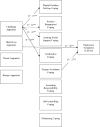Cognitive appraisals, coping and depressive symptoms in breast cancer patients
- PMID: 22888085
- PMCID: PMC4105002
- DOI: 10.1002/smi.2444
Cognitive appraisals, coping and depressive symptoms in breast cancer patients
Abstract
Depression in breast cancer patients and survivors is related to negative disease outcomes and worse quality of life. Factors that explain this depression can serve as targets of intervention. This study, guided by the Transactional Theory of Stress, examined the relationship between cognitive appraisals, coping strategies and depressive symptoms in a group of women with mostly advanced-stage breast cancer (N = 65), who scored mostly within the normal range for depressive symptoms. Path analysis was used to determine the relationships among variables, measured with the Cognitive Appraisals of Illness Scale, the Ways of Coping Questionnaire and the Center for Epidemiological Studies Depression Scale. The results of the path analysis showed that higher appraisals of harm/loss and greater use of escape-avoidance coping predicted higher depressive symptoms. These findings enhance the prediction of depression among breast cancer patients and suggest the need to examine cognitive appraisals when attempting to understand depressive symptoms.
Copyright © 2012 John Wiley & Sons, Ltd.
Conflict of interest statement
Ethical Guidelines:
There was no conflict of interest for any of the authors that may have affected our work on this manuscript.
The Indiana University Institutional Review Board approved this study, IRB # 0605-71, In August of 2006.
References
-
- Ahmed MM, Musil CM, Zauszniewski JA, Resnik MI. Prostate cancer: Appraisal, coping and health status. Journal of Gerontological Nursing. 2005;31(10):34–43. - PubMed
-
- Ben-Zur H, Gilbar O, Lev S. Coping with breast cancer: Patient, spouse, and dyad models. Psychosomatic Medicine. 2001;63(1):32–39. - PubMed
-
- Bjorck JP, Hopp DP, Jones LW. Prostate cancer and emotional functioning: Effects of mental adjustment, optimism, and appraisal. Journal of Psychosocial Oncology. 1999;17(1):71–85.
-
- Bowman KF, Rose JH, Deimling GT. Appraisal of the cancer experience by family members and survivors in long-term survivorship. Psycho-Oncology. 2006;15:834–845. - PubMed
-
- Costanzo ES, Lutgendorf SK, Rothrock NE, Anderson B. Coping and quality of life among women extensively treated for gynecological cancer. Psycho-Oncology. 2006;15:132–142. - PubMed
Publication types
MeSH terms
Grants and funding
LinkOut - more resources
Full Text Sources
Medical


